- News
The story of operating room No.6:
The story of operating room No.6:
On the road.
From the vibrant city of Shanghai comes Ms. W, a free-spirited cyclist. To her, cycling is more than just a sport; it is a way of life, a philosophy. Every week, she gathers with her team, embarking on journeys that span at least 80 kilometers. They navigate bustling urban streets and tranquil paths, wander through
expansive countryside fields, each ride a dialogue between her and her soul, a bridge connecting her inner self to the world. This is their quest for spiritual
tranquility.
Ms. W’s story began 13 years ago, on an ordinary day marked by a routine check-up, a moment that transformed her life forever.
01 Unexpected change
/ ON THE ROAD. /
Life is a journey against the current, and I am but a traveler.
Madam W, who had always prided herself on maintaining the healthiest body through long-term exercise habits, found herself unable to accept the news that her body harbored a hidden peril. The medical report revealed a silent intruder growing within her brain—a meningioma at the clivus. For a woman accustomed to challenging herself, this revelation posed one of the greatest trials of her life.
After a brief period of confusion, Madam W swiftly regained her composure. She embarked on a determined quest, consulting various hospitals and relentlessly searching for medical information to find the best treatment plan. However, as her understanding of the surgery's risks and potential postoperative complications, especially the threat of paralysis, deepened, her hesitation grew more palpable.
Once struck by paralysis,
Her freedom and dignified life
Will be lost forever,
A solemn chapter closed,
A dream that fades into the silent night.
02 Unusual Decision
/ ON THE ROAD. /
She asked herself again and again.
Never again to run freely or cycle,
Never again to chase the joys that once delighted,
...even losing the very ability to move on my own,
What meaning remains in life?
Sitting by the window, Ms. W gazed into the boundless night outside, her heart flooded with endless thoughts. Finally, she made a brave and extraordinary decision: to forego treatment, choosing instead to embrace a joyful heart and cherish every moment of her health. She yearned for a life of freedom and dignity.
Ms. W decided to set out on a new cycling journey, hoping to reclaim the joy she had lost and rediscover the meaning of life and herself. Meanwhile, upon learning of her mother's illness, Ms. W's daughter resolutely resigned from her job to spend more time with her.
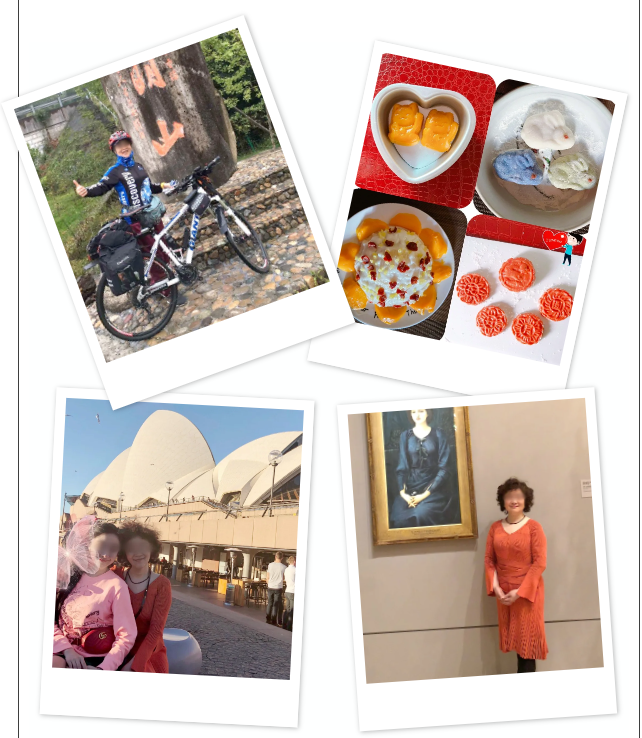
Mrs. W and her daughter's trip
Thus began an unforgettable journey for the mother and daughter. They immersed themselves in the diverse cultures of different lands, traversing mountains and rivers around the globe. From the towering peaks of Asia to the quaint towns of Europe, from the vast plains of Africa to the lush rainforests of South America, they cycled through the world's wonders, leaving traces of their passage in every city. This was a journey of true significance, a journey of life.
Together, they explored, they shared, they remained by each other’s side, experiencing the myriad miracles and beauties of life. They created countless precious memories, moments of eternal joy and tenderness.
03 Ten years later: The path winds along mountain ridges.
In the blink of an eye, a decade slipped away, and just as this unexpected interlude was fading from the lives of Mrs. W and her family, the cruel note of misfortune sounded unrelentingly. In the summer of 2021, Mrs. W's left ear began to buzz incessantly, a tinnitus that lingered for three months without the slightest sign of relief.
In September, burdened with worry, Mrs. W visited the Neurosurgery Department of Shanghai's First People's Hospital. Dr. Lou Meiqing listened attentively to her symptoms and condition, quickly delivering an accurate diagnosis: Mrs. W was suffering from a petroclival meningioma, a tumor that had quietly grown over the decade to a formidable 43mm by 33mm by 37mm. Once again, she found herself at the crossroads of fate.
Mrs. W shared her story and long-held anxieties with Dr. Lou, who patiently addressed each concern. Surprisingly, this time, Mrs. W made an unexpected decision. Unlike before, she resolutely chose to undergo surgery.
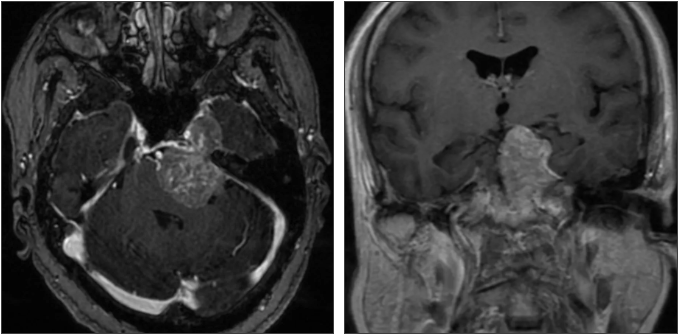
MRI before the surgery
Dr. Lou, slightly astonished, asked her the reason for this change. Mrs. W responded firmly, "Seeing so many successful cases here with my own eyes, and feeling the warmth and kindness from the director, filled me with immense trust and reassurance.
04 Surgery Day
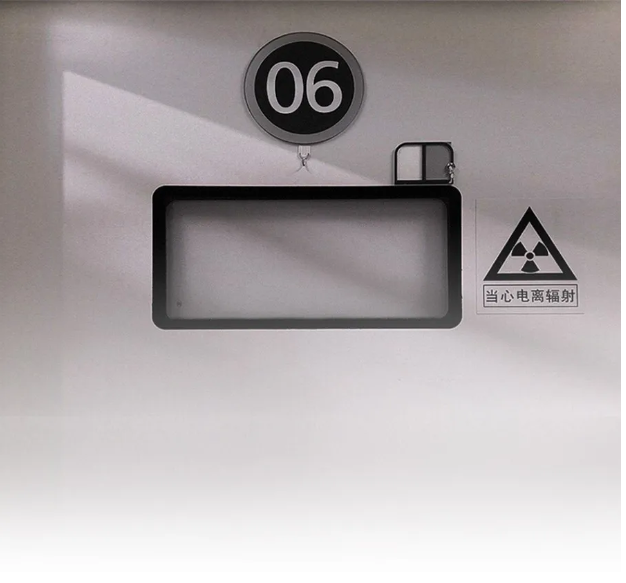
Mrs. W's tumor, a meningioma of the petroclival region, resides in the dominant hemisphere on the left side. This growth straddles the middle and posterior cranial fossae, invading the cavernous sinus and exerting severe pressure on the brainstem in the posterior fossa. Such a condition might lead to a gradual instability in gait, increasing the risk of falls. As the brainstem is critically compressed, its functions are compromised, causing headaches, vomiting, cranial nerve palsies, and potentially life-threatening consequences.
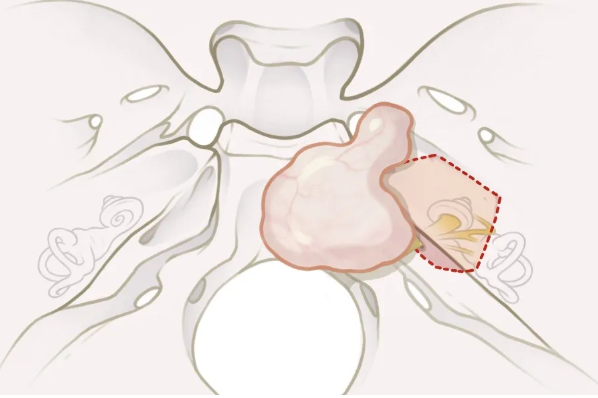
This diagram illustrates the anterior, middle, and posterior cranial fossae with the tumor straddling the middle and posterior cranial fossae. The solid line encloses the tumor's location, while the dashed line indicates the extent of bone erosion.
Our surgical philosophy and methods:
Concept: Using a minimally invasive approach anterior to the ear, we prioritize protecting the brainstem, cranial nerves, and brain tissue to minimize postoperative reactions.
We adopted the Kawase approach, removing bone extradurally to create space through the erosion of the anterior petrous bone. This space allowed us to excise the tumor as completely as possible.
This method minimizes traction on the left temporal lobe, thereby preventing contusion and indirectly preserving the language functions of the dominant hemisphere. Ultimately, we successfully removed the tumor from both the cavernous sinus in the middle cranial fossa and the posterior cranial fossa in one go.
*The language functions of the dominant hemisphere include both the motor and sensory language centers. If the sensory language center is affected, the patient may be unable to comprehend others' speech or their own, significantly impacting daily life.

Post-surgery MRI of the patient
Ms. W's surgery began at eight in the morning and extended until half past one in the afternoon. The operating room was steeped in an atmosphere of intense focus. Despite the surgery's high level of difficulty, the dedicated team proceeded with meticulous care, each step unfolding as planned. They carefully excised the tumor while safeguarding the brainstem and cranial nerves. The adhesion between the tumor and cranial nerves was the crux of the operation; any impact on these nerves could result in facial and ocular impairments. With the successful separation of the trigeminal, facial, vestibulocochlear, abducens nerves, and the brainstem interface, the surgery was completed without a hitch. The five hours felt like a fleeting moment, as Ms. W’s tumor was triumphantly removed without any complications.
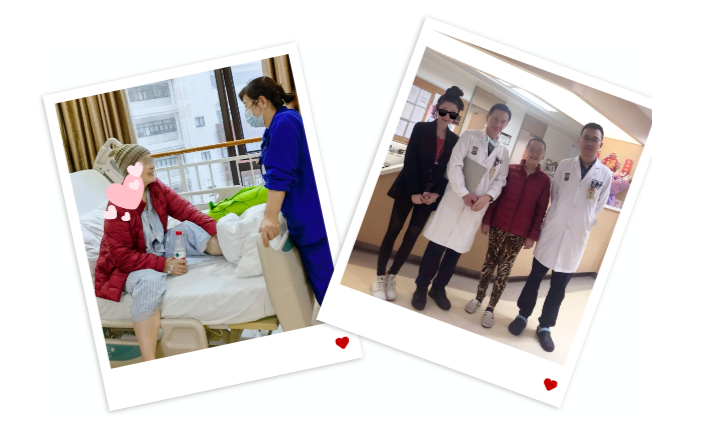
During Ms. W's hospital stay
05: Rebirth after catastrophe
In March, Shanghai is kissed by the spring breeze, tender buds of willow trees swaying gently. The drizzle falls lightly, brushing every corner of the city, washing away the winter's chill. Stepping to the rhythm of the rain, accompanied by her daughter, Mrs. W walks with light steps to the Neurosurgery Department of Shanghai First People's Hospital, to see the chief expert, Dr. Lou. She enters the room with a heart full of gratitude, facing the doctor who had once given her a new life.
"Hello, Dr. Lou!" Mrs. W enters the consultation room with a smile. The chief greets them with a smile, as if an old friend is waiting for their arrival. This is her third year after recovery, and for the past two years, she has come to the hospital regularly for check-ups. This year, her test results have been as good as expected, with no signs of paralysis or recurrence.
Mrs. W gradually opens her heart, telling her story and unable to hold back her tears.
Thinking back to the bleak autumn day two years ago, when her life came to a standstill due to a meningioma. Now, she has passed through those dark days!
"I am truly grateful to the chief and your team. We are considering selling our house and buying another one near your hospital!"
As Mrs. W and her daughter leave the hospital, the rain stops, and the sun shines upon them. Mrs. W's mood seems to be infected by this sunlight. She knows she has conquered the disease and regained her new life!
Mrs. W once again rides her bicycle, the wind blowing through her hair. The wheels gently roll on the ground, carrying her through the city streets. She feels the freedom of her body, the power of every pedal. Her heart sends out the most sincere cry to life:
"I am here! I am still on the road!"
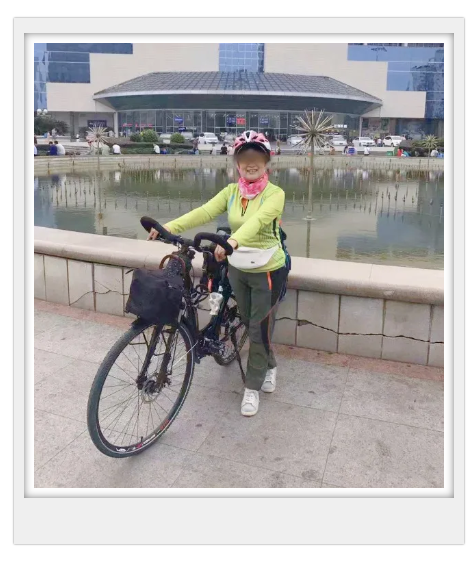
ABOUT US
The Neurosurgery Department of Shanghai General Hospital was founded by the renowned neurosurgery pioneer Professor Cai Baoxian in the 1960s. Through four generations of inheritance and development by Professor Chen Daoli, Professor Zhu Xiaojiang, and the current director Professor Lou Meiqing, it has become a modern research discipline integrating medical treatment, teaching, and scientific research. It is now a doctoral degree granting point of Shanghai Jiao Tong University.

Dr. Lou Meiqing is currently the Chief of Neurosurgery, Professor, Chief Physician, and Doctoral Supervisor at the Shanghai First People's Hospital.
He is a member of the Skull Base Surgery Committee of the World Federation of Neurosurgical Societies (WFNS), a national member of the Chinese Medical Association Neurosurgery Committee, a standing committee member of the Shanghai Neurosurgery Committee of the Chinese Medical Association, a member of the Neuroendoscopy Professional Committee of the Chinese Physicians Association, a member of the Microinvasive Neurosurgery Professional Committee of the Chinese Physicians Association, a member of the Neuro-oncology Professional Group of the Neurosurgery Branch of the Chinese Medical Association, a member of the Cerebrovascular Disease Professional Committee of the Chinese Physicians Association, the Vice Chairman of the Neuro-oncology Professional Committee of the Shanghai Anti-Cancer Association, and a member of the Chinese Pituitary Tumor Collaboration Group.
Dr. Lou has been working in neurosurgery for 32 years, with a high level of proficiency in microsurgery and endoscopic neurosurgical techniques. He has accumulated rich clinical experience in the surgical treatment of intracranial tumors, cerebrovascular diseases, spinal cord disorders, and other neurological diseases, with a total of over 8000 cases. He specializes in endoscopic and minimally invasive techniques for the treatment of various complex skull base tumors, as well as the restoration of neurological function in patients with facial paralysis. He also specializes in minimally invasive treatments for trigeminal neuralgia, hemifacial spasm, and other neuropathic pain disorders.
Dr. Lou’s outpatient appointment booking method: Follow the official WeChat account of "Shanghai First People's Hospital" for appointments.

Inpatient appointment registration for Dr. Lou Meiqing's neurosurgery team at Shanghai Jiao Tong University.
Dr. Lou’s team for disease consultation and hospitalization appointment contact information: 17317607905 [ WeChat/Phone ]
